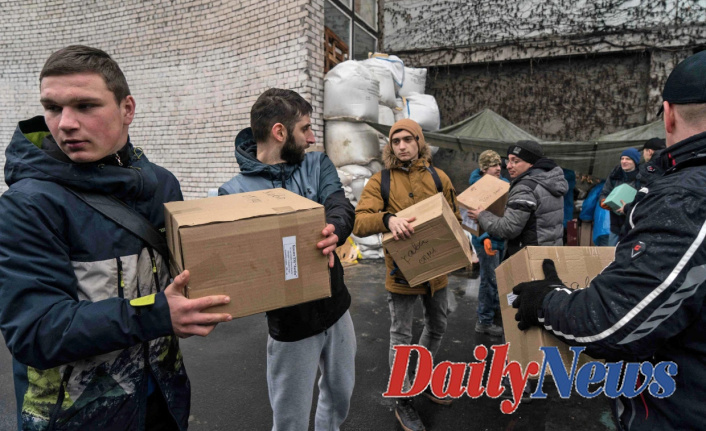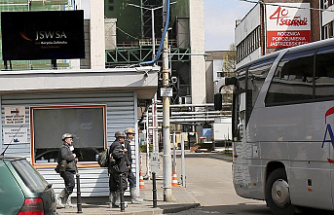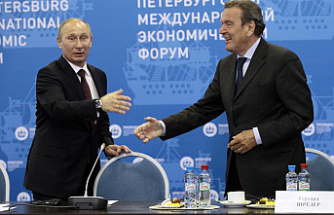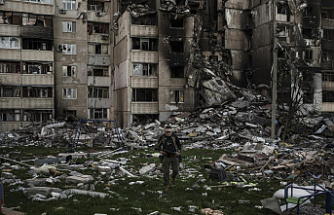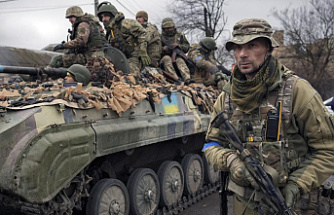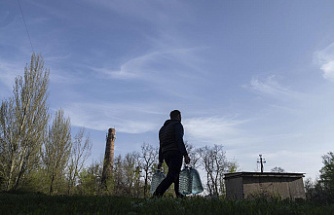Serhiy Prytula, a beloved TV and radio host in Ukraine, imagined that he would transform an office building in downtown Kyiv to be the headquarters for his new political party. He would shape his country's future from a table before a cutout of Ukraine backlit.
His goal has changed now that Russia invaded Ukraine. The building is no longer a place for politics but a place to coordinate military supplies.
There are no leaflets or politicians inside. Only soldiers and volunteers are seen picking up boxes containing medicines, canned foods, bulletproof vests and helmets. These items are then used to drop bombs on the Russian military.
Prytula stated over the telephone that "we don't care about politics here in Ukraine now." "We are all volunteers or soldiers now. We have one question: How do we save our state?"
Prytula, who has a lot of social media fame, set up a large supply network. Prytula is collecting donations and negotiating the purchase bulletproof vests or helmets from Turkish manufacturers. He also pressures car dealers to supply vehicles for the territorial defense at steep discount rates. He also operates warehouses from Poland and Kyiv and moves numerous buses and trucks with supplies all over the country.
His work is only one example of the largest supply operation since the Cold War and Berlin airlift. Numerous groups are working together to coordinate how to transport humanitarian, medical, and military aid in order to help the country's defense as millions of Ukrainians flee across its borders.
Just outside of the country, government agencies, NATO partners, and philanthropic organizations are assembling supplies and helping refugees.
"This is an extremely intense situation where literally millions of people are flowing out while you try to push supplies in -- you can immediately imagine the logistical problems here," stated Sarah Mendelson, the U.S. Ambassador to the United Nations Economic and Social Council and a deputy at U.S. Agency for International Development during Obama's administration.
She added, "This is an extreme high-wire act."
USAID stated that it had sent its disaster experts to Poland in order to "assess needs and identify assistance and determine viable routes to Ukraine to determine assistance."
A spokesperson for the agency stated that "the situation on ground in Ukraine is rapidly changing." "Continued hostilities continue damage and destruction roads and bridges, and impact train infrastructure, making it difficult to provide relief operations. The already dire situation will only get worse if humanitarian access is not improved.
Multiple supply groups stated that the six-hour drive from Kyiv to Lviv (on the Polish border) takes approximately a day. As Kyiv becomes increasingly surrounded , the situation has become more complicated. Some roads and bridges have been damaged or destroyed. There are also dangers to some routes due to the movements of Russian troops and bombings.
Vitali Klitschko (Kyiv's Mayor), a former heavyweight boxing champ, told Reuters that there was enough food in the city to last two weeks. He said that even though the Russian forces are pushing in on Kyiv's borders, supply lines for the 2,000,000 people still in the city remain open.
He stated that electricity, heating, and gas are all available right now, as well as water.
Although it is almost impossible to move supplies into the occupied areas of the country, especially near Kharkiv and Mariupol, and Kherson, Prytula and other people claimed that they had some success in the past week. As supplies continue to pile up, it is becoming increasingly difficult to find space in Lviv's warehouses.
Kseniya Kvitka works for the State Enterprise Medical Procurement of Ukraine. She said that her agency is working with the Ukrainian Ministry of Health in order to compile a list of over 300 items. These include medicines and medical equipment. They have also asked manufacturers and suppliers to sell the items at a significant discount. To ensure that supplies are continued to flow into Ukraine, they also collaborate with outside organizations.
Local hospitals and military garrisons upload their reserve status to a central database and place requests whenever they run out. Kvitka's agency moves supplies to 31 warehouses located throughout the country, which are accessible by the military and hospitals.
She acknowledged that logistical problems still exist, but it isn't as chaotic as it was at war's beginning. They are improving their ability to track and move items through their network using trucks and outside contractors, ensuring that medicines don't get stuck at any one place.
They move shipments through the Ukrainian railway service to reach areas that are more difficult to reach.
Kvitka stated that they try to get a better view of all the hospitals and warehouses in every region so they can provide all the necessary medicines and equipment for war-wounded soldiers and regular citizens.
The Ukraine's border line with Poland has been an important entry point for West support, which allowed the country to continue its fight against Russia.
Malcolm Chalmers, the deputy director-general at the Royal United Services Institute in London, said that the 332-mile border with Poland was "absolutely crucial" for Ukraine's defense. However, there are supplies running through the borders with Slovakia and Romania.
He said that there are many routes from Poland to Ukraine. There's no single road so there are lots of ways in. Russia would have a hard time policing the border if it traveled west. It presents a real challenge to the Russians."
Russia warned Ukraine's West partners, who are providing assistance -- especially military equipment -- that Russia would not tolerate it.
Russian Foreign Minister Sergey Lavrov warned that the actions of foreign governments supporting Ukraine were "responsible for their conduct"
Experts said that this level of vitriol has made Poland nervous and wanted America to act as a middleman. They sent Polish jets designated for Ukraine from a U.S. Army Base in Germany.
This isn't the only point of tension.
According to Michal Baranowski, a senior fellow at the German Marshall Fund and director of its Warsaw office, the Polish government has been following a Russian military unit in Belarus. It has stopped near the Ukrainian and Polish borders, where many supplies are flowing through.
He said that the threat of a Russian missile dropping within miles of the Polish border, and the strategic importance of the Ukrainian supply chain are the reasons NATO allies have pressed the U.S. for two Patriot anti-missile system batteries.
"Both here and at NATO headquarters, we take any possibility -- whether intended or unintended - some level of escalation, spillover, seriously," Baranowski stated. He noted that NATO allies in Eastern Europe were aware of Russian President Vladimir Putin's declaration to push back the NATO border. "We believe it unlikely, but many unimaginable things have already occurred."
It is unthinkable that the Ukrainians' war effort could be slowed down by a lack of steady supplies. It is a difficult concept to grasp, given the enormous need in the country.
Prytula created a supply center in Kyiv to move equipment in bulk to soldiers. However, he still receives hundreds of calls each day asking for equipment. Sometimes it's the wife of a soldier begging for a bulletproof vest. Other times, it's an elderly person asking for a helmet.
These are difficult calls, but he says he and his team of volunteers remain focused on their mission.
Prytula stated that everyone understands what they should do. "That's what makes it a little easier for me: I can take on the responsibility and we can help each other."

